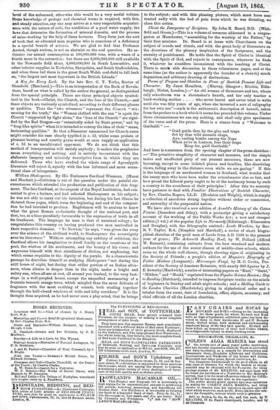William Shakespeare. By His Eminence Cardinal Wiseman. (Hurst and Blackett.)--Criticism
is out of the question under the painful cir- cumstances which attended the production and publication of this frag- ment. The late Cardinal, at the request of the Royal Institution, had con- sented to give a lecture, and had selected Shakespeare as his subject ; he was not able to carry out his intention, but during his last illness he dictated these pages, which form the beginning and end of the composi- tion he had intended to produce. Englishmen will be anxious to know what the great Roman ecclesiastic thought of the national poet, and that, too, at a time peculiarly favourable to the expression of truth in all its frankness. The language he uses is that of unmixed eulogy ; he congratulates this country on having produced two mon unrivalled in their respective domains. "To Newton," he say; "was given the sway over the science of the civilized world, to Shakespeare tho sovereignty over its literature." Without attempting any subtlety of criticism, the Cardinal allows his imagination to dwell fondly on the creations of the poet, the wisdom of his sentiments, and the beauty of his verse ; and expresses himself with that stateliness of diction, not nnpleasing, but which seems requisite to the dignity of the purple. In a characteristic passage he describes himself as studying Shakespeare "not during the still hours of night, but during that stiller portion of an Italian after- noon, when silence is deeper than in the night, under a bright and sultry sun, when all are at rest, all around you hushed, to the very foot- steps in a well-peopled house, except the nnquelled murmuring of a fountain beneath orange trees, which mingled thus the most delicate of fragrance with the most soothing of sounds, both stealing together through the half-closed windows of wide and lofty corridors." It is the thought thus acquired, as he had never seen a play acted, that he brings to the subject; and with this pleasing picture, which must have con- trasted sadly with the bed of pain from which he was dictating, we close this notice.






























 Previous page
Previous page